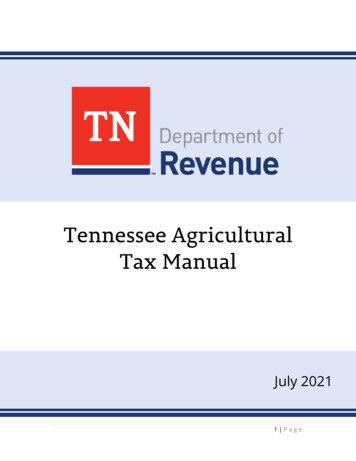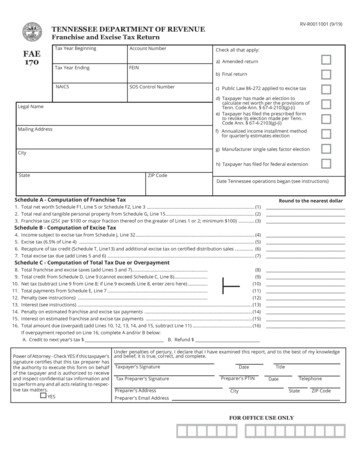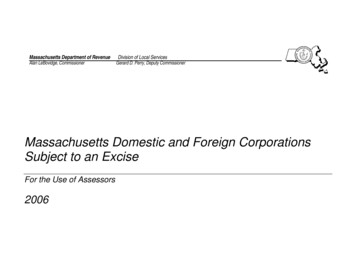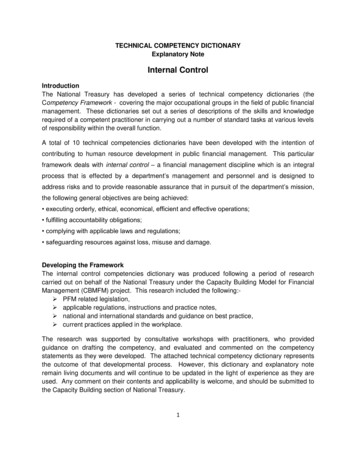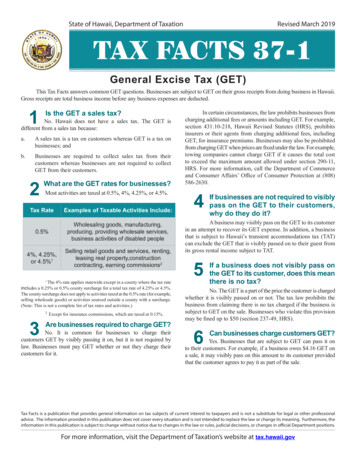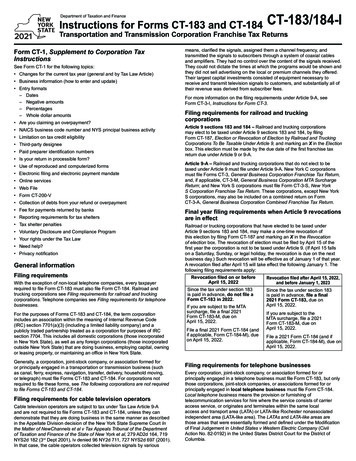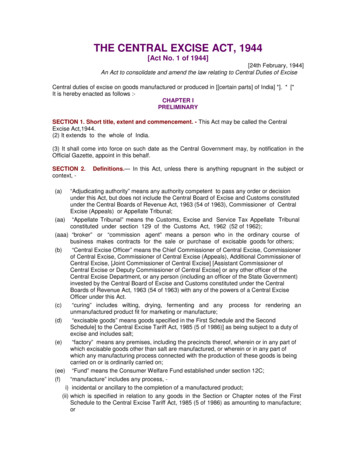
Transcription
THE CENTRAL EXCISE ACT, 1944[Act No. 1 of 1944][24th February, 1944]An Act to consolidate and amend the law relating to Central Duties of ExciseCentral duties of excise on goods manufactured or produced in [[certain parts] of India] *]. * [*It is hereby enacted as follows :CHAPTER IPRELIMINARYSECTION 1. Short title, extent and commencement. - This Act may be called the CentralExcise Act,1944.(2) It extends to the whole of India.(3) It shall come into force on such date as the Central Government may, by notification in theOfficial Gazette, appoint in this behalf.SECTION 2.context, �� In this Act, unless there is anything repugnant in the subject or“Adjudicating authority” means any authority competent to pass any order or decisionunder this Act, but does not include the Central Board of Excise and Customs constitutedunder the Central Boards of Revenue Act, 1963 (54 of 1963), Commissioner of CentralExcise (Appeals) or Appellate Tribunal;“Appellate Tribunal” means the Customs, Excise and Service Tax Appellate Tribunalconstituted under section 129 of the Customs Act, 1962 (52 of 1962);“broker” or “commission agent” means a person who in the ordinary course ofbusiness makes contracts for the sale or purchase of excisable goods for others;“Central Excise Officer” means the Chief Commissioner of Central Excise, Commissionerof Central Excise, Commissioner of Central Excise (Appeals), Additional Commissioner ofCentral Excise, [Joint Commissioner of Central Excise] [Assistant Commissioner ofCentral Excise or Deputy Commissioner of Central Excise] or any other officer of theCentral Excise Department, or any person (including an officer of the State Government)invested by the Central Board of Excise and Customs constituted under the CentralBoards of Revenue Act, 1963 (54 of 1963) with any of the powers of a Central ExciseOfficer under this Act.“curing” includes wilting, drying, fermenting and any process for rendering anunmanufactured product fit for marketing or manufacture;“excisable goods” means goods specified in the First Schedule and the SecondSchedule] to the Central Excise Tariff Act, 1985 (5 of 1986)] as being subject to a duty ofexcise and includes salt;“factory” means any premises, including the precincts thereof, wherein or in any part ofwhich excisable goods other than salt are manufactured, or wherein or in any part ofwhich any manufacturing process connected with the production of these goods is beingcarried on or is ordinarily carried on;“Fund” means the Consumer Welfare Fund established under section 12C;“manufacture” includes any process, incidental or ancillary to the completion of a manufactured product;which is specified in relation to any goods in the Section or Chapter notes of the FirstSchedule to the Central Excise Tariff Act, 1985 (5 of 1986) as amounting to manufacture;or
(iii) which, in relation to the goods specified in the Third Schedule, involves packing orrepacking of such goods in a unit container or labelling or re-labelling of containersincluding the declaration or alteration of retail sale price on it or adoption of any othertreatment on the goods to render the product marketable to the consumer, and the word“manufacturer” shall be construed accordingly and shall include not only a person whoemploys hired labour in the production or manufacture of excisable goods, but also anyperson who engages in their production or manufacture on his own account;(ff) ”National Tax Tribunal” means the National Tax Tribunal established under section 3 ofthe National Tax Tribunal Act, 2005;(g) “prescribed” means prescribed by rules made under this Act;(h) “sale” and “purchase”, with their grammatical variations and cognate expressions, meanany transfer of the possession of goods by one person to another in the ordinary courseof trade or business for cash or deferred payment or other valuable consideration;(i)***(j)***(jj)***(k) “wholesale dealer” means a person who buys or sells excisable goods wholesale for thepurpose of trade or manufacture, and includes a broker or commission agent who, inaddition to making contracts for the sale or purchase of excisable goods for others,stocks such goods belonging to others as an agent for the purpose of sale.SECTION 2A. References of certain expressions. — In this Act, save as otherwise expresslyprovided and unless the context otherwise requires, references to the expressions “duty”,“duties”, “duty of excise” and “duties of excise” shall be construed to include a reference to“Central Value Added Tax (CENVAT)”.CHAPTER IILEVY AND COLLECTION OF DUTYSECTION 3. Duties specified in First Schedule and the Second Schedule to the CentralExcise Tariff Act, 1985 to be levied. —(1) There shall be levied and collected in such manner as may be prescribed, (a) a duty of excise to be called the Central Value Added Tax (CENVAT)] on all excisable goods(excluding goods produced or manufactured in special economic zones) which are produced ormanufactured in India as, and at the rates, set forth in the First Schedule to the Central ExciseTariff Act, 1985 (5 of 1986);(b) a special duty of excise, in addition to the duty of excise specified in clause (a) above, onexcisable goods [(excluding goods produced or manufactured in special economic zones)]specified in the Second Schedule to the Central Excise Tariff Act, 1985 (5 of 1986) which areproduced or manufactured in India, as, and at the rates, set forth in the said Second Schedule.Provided that the duties of excise which shall be levied and collected on any excisable goodswhich are produced or manufactured, * *(i) * ****
(ii) by a hundred per cent export-oriented undertaking and brought to any other place in India,shall be an amount equal to the aggregate of the duties of customs which would be leviableunder the Customs Act, 1962 (52 of 1962) or any other law for the time being in force], on likegoods produced or manufactured outside India if imported into India, and where the said duties ofcustoms are chargeable by reference to their value; the value of such excisable goods shall,notwithstanding anything contained in any other provision of this Act, be determined inaccordance with the provisions of the Customs Act, 1962 (52 of 1962) and the Customs TariffAct, 1975 (51 of 1975).Explanation 1. — Where in respect of any such like goods, any duty of customs leviable for thetime being in force is leviable at different rates, then, such duty shall, for the purposes of thisproviso, be deemed to be leviable at the highest of those rates.Explanation 2. — In this proviso, *****(i) * *(ii) “hundred per cent export-oriented undertaking” means an undertaking which has beenapproved as a hundred per cent export-oriented undertaking by the Board appointedin this behalf by the Central Government in exercise of the powers conferred bysection 14 of the Industries (Development and Regulation) Act, 1951 (65 of 1951),and the rules made under that Act.;(iii) “Special Economic Zone” has the meaning assigned to it in clause (za) of section 2 ofthe Special Economic Zones Act, 2005 (28 of 2005).provisions of sub-section (1A) The (1) shall apply in respect of all excisable goods other thansalt which are produced or manufactured in India by, or on behalf of, Government, as they applyin respect of goods which are not produced or manufactured by Government.(2) The Central Government may, by notification in the Official Gazette, fix, for the purpose oflevying the said duties, tariff values of any articles enumerated, either specifically or undergeneral headings, in the First Schedule and the Second Schedule to the Central Excise Tariff Act,1985 (5 of 1986) as chargeable with duty ad valorem and may alter any tariff values for the timebeing in force.(3) Different tariff values may be fixed (a) for different classes or descriptions of the same excisable goods; or(b) for excisable goods of the same class or description (i)produced or manufactured by different classes of producers or manufacturers;or(ii)sold to different classes of buyers :Provided that in fixing different tariff values in respect of excisable goods falling under sub-clause(i) or sub-clause (ii), regard shall be had to the sale prices charged by the different classes ofproducers or manufacturers or, as the case may be, the normal practice of the wholesale trade insuch goods.SECTION [3A ] * * *SECTION 4.excisableValuation of goods for purposes of charging of duty of excise. -(1) Where under this Act, the duty of excise is chargeable on any excisable goods with referenceto their value, then, on each removal of the goods, such value shall -
(a) in a case where the goods are sold by the assessee, for delivery at the time and placeof the removal, the assessee and the buyer of the goods are not related and the priceis the sole consideration for the sale, be the transaction value;(b) in any other case, including the case where the goods are not sold, be the valuedetermined in such manner as may be prescribed.Explanation. - For the removal of doubts, it is hereby declared that the price-cum-duty ofthe excisable goods sold by the assessee shall be the price actually paid to him for the goodssold and the money value of the additional consideration, if any, flowing directly or indirectly fromthe buyer to the assessee in connection with the sale of such goods, and such price-cum-duty,excluding sales tax and other taxes, if any, actually paid, shall be deemed to include the dutypayable on such goods.(2) The provisions of this respect of any excisable goods for which a tariff section shall not applyin value has been fixed under sub-section (2) of section 3.(3) For the purpose of this section,(a) “assessee” means the person who is liable to pay the duty of excise under this Act andincludes his agent;(b) persons shall be deemed to be “related” if (i) they are inter-connected undertakings;(ii) they are relatives;(iii) amongst them the buyer is a relative and a distributor of the assessee, or a subdistributor of such distributor;or(iv) they are so associated that they have interest, directly or indirectly, in thebusiness of each other.Explanation. — In this clause shall (i) “inter-connected undertakings” have the meaning assigned to it in clause (g)of section 2 of the Monopolies and Restrictive Trade Practices Act, 1969 (64 of 1969); andshall have the meaning (ii) “relative” assigned to it in clause (41) of section 2 of theCompanies Act, 1956 (1 of 1956);means (c) “place of removal” (i) factory or any other place or premises of production or manufacture of theexcisable goods;(ii) warehouse or any other place or premises wherein the excisable goods havebeen permitted to be deposited without [payment of duty;](iii) depot, premises of a consignment agent or any other place or premises fromwhere the excisable goods are to be sold after their clearance from the factory;from where such goods are removed;(cc) “time of removal”, in respect of the excisable goods removed from the place ofremoval referred to in sub-clause (iii) of clause (c), shall be deemed to be the time atwhich such goods are cleared from the factory;
(d) “transaction value” means the price actually paid or payable for the goods, when sold,and includes in addition to the amount charged as price, any amount that the buyer isliable to pay to, or on behalf of, the assessee, by reason of, or in connection with thesale, whether payable at the time of the sale or at any other time, including, but notlimited to, any amount charged for, or to make provision for, advertising or publicity,marketing and selling organization expenses, storage, outward handling, servicing,warranty, commission or any other matter; but does not include the amount of duty ofexcise, sales tax and other taxes, if any, actually paid or actually payable on suchgoods.SECTION 4A. Valuation of excisable goods with reference to retail sale price. (1) The Central Government may, by notification in the Official Gazette, specify any goods, inrelation to which it is required, under the provisions of the Standards of Weights and MeasuresAct, 1976 (60 of 1976) or the rules made thereunder or under any other law for the time being inforce, to declare on the package thereof the retail sale price of such goods, to which theprovisions of sub-section (2) shall apply.(2) Where the goods specified under sub-section (1) are excisable goods and are chargeable toduty of excise with reference to value, then, notwithstanding anything contained in section 4, suchvalue shall be deemed to be the retail sale price declared on such goods less such amount ofabatement, if any, from such retail sale price as the Central Government may allow by notificationin the Official Gazette.(3) The Central Government may, for the purpose of allowing any abatement under sub-section(2), take into account the amount of duty of excise, sales tax and other taxes, if any, payable onsuch goods.(4) Where any goods specified under sub-section (1) are excisable goods and the manufacturer(a)removes such goods from the place of manufacture, without declaring the retail saleprice of such goods on the packages or declares a retail sale price which is not theretail sale price as required to be declared under the provisions of the Act, rules orother law as referred to in sub-section (1); or(b)tampers with, obliterates or alters the retail sale price declared on the package ofsuch goods after their removal from the place of manufacture,then, such goods shall be liable to confiscation and the retail sale price of such goods shall beascertained in the prescribed manner and such price shall be deemed to be the retail sale pricefor the purposes of this section.Explanation 1. — For the purposes of this section, “retail sale price” means the maximumprice at which the excisable goods in packaged form may be sold to the ultimate consumer andincludes all taxes, local or otherwise, freight, transport charges, commission payable to dealers,and all charges towards advertisement, delivery, packing, forwarding and the like and the price isthe sole consideration for such sale :Provided that in case the provisions of the Act, rules or other law as referred to in subsection (1) require to declare on the package, the retail sale price excluding any taxes, local orotherwise, the retail sale price shall be construed accordingly.
Explanation 2. — For the purposes of this section, (a)where on the package of any excisable goods more than one retail sale priceis declared, the maximum of such retail sale prices shall be deemed to be theretail sale price;(b)where the retail sale price, declared on the package of any excisable goods atthe time of its clearance from the place of manufacture, is altered to increasethe retail sale price, such altered retail sale price shall be deemed to be theretail sale price;(c)where different retail sale prices are declared on different packages for thesale of any excisable goods in packaged form in different areas, each suchretail sale price shall be the retail sale price for the purposes of valuation of theexcisable goods intended to be sold in the area to which the retail sale pricerelates.]SECTION 5. duty onRemission of goods found deficient in quantity. —(1) The Central Government may, by rules made under this section, provide for remission of dutyof excise leviable on any excisable goods which due to any natural cause are found to bedeficient in quantity.(2) Any rules made under to the nature of the excisable goods or of sub-section (1) may, havingregard processing or of curing thereof, the period of their storage or transit and other relevantconsiderations, fix the limit or limits of percentage beyond which no such remission shall beallowed :Provided that different limit or limits of percentage may be fixed for different varieties of the sameexcisable goods or for different areas or for different seasons.SECTION 5A. Power to grant exemption from duty of excise. —(1) If the Central Government is satisfied that it is necessary in the public interest so to do, itmay, by notification in the Official Gazette exempt generally either absolutely or subject to suchconditions (to be fulfilled before or after removal) as may be specified in the notification, excisablegoods of any specified description from the whole or any part of the duty of excise leviablethereon :Provided that, unless specifically provided in such notification, no exemption therein shall applyto excisable goods which are produced or manufactured —in a free trade zone or a special (i) brought to any other place in India; or economic zone]] andby a hundred per cent export-oriented (ii) [brought to any place in India. undertaking andExplanation. — In this proviso, “free trade zone”, “special economic zone” and “hundred per centexport-oriented undertaking” shall have the same meanings as in Explanation 2 to sub-section (1)of section 3.(1A) For the removal of doubts, it is hereby declared that where an exemption under sub-section(1) in respect of any excisable goods from the whole of the duty of excise leviable thereon hasbeen granted absolutely, the manufacturer of such excisable goods shall not pay the duty ofexcise on such goods.
(2) If the Central Government is satisfied that it is necessary in the public interest so to do, it may,by special order in each case, exempt from payment of duty of excise, under circumstances of anexceptional nature to be stated in such order, any excisable goods on which duty of excise isleviable.(2A) The Central Government may, if it considers it necessary or expedient so to do for thepurpose of clarifying the scope or applicability of any notification issued under sub-section (1) ororder issued under sub-section (2), insert an explanation in such notification or order, as the casemay be, by notification in the Official Gazette at any time within one year of issue of thenotification under sub-section (1) or order under sub-section (2), and every such explanation shallhave effect as if it had always been the part of the first such notification or order, as the case maybe.(3) An exemption under sub-section (1) or sub-section (2) in respect of any excisable goods fromany part of the duty of excise leviable thereon (the duty of excise leviable thereon beinghereinafter referred to as the statutory duty) may be granted by providing for the levy of a duty onsuch goods at a rate expressed in a form or method different from the form or method in whichthe statutory duty is leviable and any exemption granted in relation to any excisable goods in themanner provided in this sub-section shall have effect subject to the condition that the duty ofexcise chargeable on such goods shall in no case exceed the statutory duty.Explanation. — “Form or method”, in relation to a rate of duty of excise means the basis,namely, valuation, weight, number, length, area, volume or other measure with reference to whichthe duty is leviable :(4) Every notification issued under sub-rule (1), and every order made under sub-rule (2), of rule8 of the Central Excise Rules, 1944, and in force immediately before the commencement of theCustoms and Central Excises Laws (Amendment) Act, 1988 (29 of 1988) shall be deemed tohave been issued or made under the provisions of this section and shall continue to have thesame force and effect after such commencement until it is amended, varied, rescinded orsuperseded under the provisions of this section.(5) Every notification issued under sub-section (1) or sub-section 2(A) shall, —(a) unless otherwise provided, come into force on the date of its issue by the CentralGovernment for publication in the Official Gazette;(b) also be published and offered for sale on the date of its issue by the Directorate of Publicityand Public Relations, Customs and Central Excise, New Delhi, under the Central Board of Exciseand Customs constituted under the Central Boards of Revenue Act, 1963 (54 of 1963).(6) Notwithstanding anything contained in sub-section (5), where a notification comes into forceon a date later than the date of its issue, the same shall be published and offered for sale by thesaid Directorate of Publicity and Public Relations on a date on or before the date on which thesaid notification comes into force.SECTION 5B. Non-reversal of CENVAT credit. —Where an assessee has paid duty of excise on a final product and has been allowed credit of theduty or tax or cess paid on inputs, capital goods and input services used in making of the saidproduct, but subsequently the process of making the said product is held by the court as notchargeable to excise duty, the Central Government may, by notification, order for non-reversal of
such credit allowed to the assessee subject to such conditions as may be specified in the saidnotification :Provided that the order for non-reversal of credit shall not apply where an assessee haspreferred a claim for refund of excise duty paid by him :Provided further that the Central Government may also specify in the notification referred toabove for non-reversal of credit, if any, taken by the buyer of the said product.SECTION 6. Any prescribed person who is engaged in - Registration of certain persons.—(a) the production or manufacture or any process of production or manufacture of anyspecified goods included in the First Schedule and the Second Schedule to theCentral Excise Tariff Act, 1985 (5 of 1986), or(b) the wholesale purchase or sale (whether on his own account or as a broker orcommission agent) or the storage of any specified goods included in [the FirstSchedule and the Second Schedule] to the Central Excise Tariff Act, 1985 (5 of1986),shall get himself registered with the proper officer in such manner as may be prescribed.SECTION 7. ****SECTION 8. Restriction on possession of excisable — goods.From such date as may be specified in this behalf by the Central Government by notification inthe Official Gazette, no person shall, except as provided by rules made under this Act, have in hispossession [any goods specified in the Second Schedule] in excess of such quantity as may beprescribed for the purposes of this section as the maximum amount of such goods or of anyvariety of such goods which may be possessed at any one time by such a person.SECTION 9. Offences and penalties. —(1) Whoever commits any of the following offences, namely: contravenes any of the provisions of section 8 or of a rule made under clause (iii) orclause (xxvii) of sub-section (2) of section 37;(b)evades the payment of any duty payable under this Act;removes any excisable goods in contravention of any of the provisions of this Act or(bb)any rules made thereunder or in any way concerns himself with such removal;acquires (bbb) transporting, depositing, possession of, or in any way concernshimself in keeping, concealing, selling or purchasing, or in any other manner deals(bbb)with any excisable goods which he knows or has reason to believe are liable toconfiscation under this Act or any rule made thereunder;the provisions of this Act or the rules made thereunder in relation to credit of any duty(bbbb)allowed to be utilised towards payment of excise duty on final products;fails to supply any information which he is required by rules made under this Act to(c)supply, or (unless with a reasonable belief, the burden of proving which shall be uponhim, that the information supplied by him is true) supplies false information;(a)
(d)attempts to commit, or abets the commission of, any of the offences mentioned inclauses (a) and (b) of this section;shall be punishable, (i) the duty leviable in the case of an offence relating to any excisable goods, thereon underthis Act exceeds one lakh of rupees, with imprisonment for a term which may extend to sevenyears and with fine :Provided that in the absence of special and adequate reasons to the contrary to be recordedin the judgment of the Court such imprisonment shall not be for a term of less than six months;in (ii) extend to three any other case, with imprisonment for a term which may years or withfine or with both.(2) If any person convicted of an offence under this section is again convicted of an offence underthis section, then, he shall be punishable for the second and for every subsequent offence withimprisonment for a term which may extend to seven years and with fine :Provided that in the absence of special and adequate reasons to the contrary to be recorded inthe judgment of the Court such imprisonment shall not be for a term of less than six months.(3) For the purposes of sub-sections (1) and (2), the following shall not be considered as specialand adequate reasons for awarding a sentence of imprisonment for a term of less than sixmonths, namely :the fact that the accused has been (i) time for an offence under this convicted for the firstAct;(ii)the fact that in any proceeding under this Act, other than a prosecution, the accusedhas been ordered to pay a penalty or the goods in relation to such proceedings havebeen ordered to be confiscated or any other action has been taken against him forthe same act which constitutes the offence;(iii) the fact that the accused was not the principal offender and was acting merely as acarrier of goods or otherwise was a secondary party in the commission of theoffence;(iv) the age of the accused.]SECTION 9A. Certain offences to be non-cognizable.(1) Notwithstanding anything contained in the Code of Criminal Procedure, 1898 (5 of 1898),offences under section 9 shall be deemed to be non-cognizable within the meaning of that Code.(2) Any offence under this Chapter may, either before or after the institution of prosecution, becompounded by the Chief Commissioner of Central Excise on payment, by the person accused ofthe offence to the Central Government, of such compounding amount as may be prescribed.SECTION 9AA.Offences by companies. —(1) Where an offence under this Act has been committed by a company, every person who, atthe time the offence was committed was in charge of, and was responsible to, the company for
the conduct of the business of the company, as well as the company, shall be deemed to beguilty of the offence and shall be liable to be proceeded against and punished accordingly :Provided that nothing contained in this sub-section shall render any such person liable to anypunishment provided in this Act, if he proves that the offence was committed without hisknowledge or that he had exercised all due diligence to prevent the commission of such offence.(2) Notwithstanding anything contained in sub-section (1), where an offence under this Act hasbeen committed by a company and it is proved that the offence has been committed with theconsent or connivance of, or is attributable to any neglect on the part of, any director, manager,secretary or other officer of the company, such director, manager, secretary or other officer shallalso be deemed to be guilty of that offence and shall be liable to be proceeded against andpunished accordingly.Explanation. — For the purposes of this section, (a) “company” means any body corporate and includes a firm or other association ofindividuals; and(b) “director” in relation to a firm means a partner in the firm.SECTION 9B. Power of Court to publish name, place of business, etc., of personsconvicted under the Act. —(1) Where any person is convicted under this Act for contravention of any of the provisionsthereof, it shall be competent for the Court convicting the person to cause the name and place ofbusiness or residence of such person, nature of the contravention, the fact that the person hasbeen so convicted and such other particulars as the Court may consider to be appropriate in thecircumstances of the case, to be published at the expense of such person, in such newspapers orin such manner as the Court may direct.(2) No publication under sub-section (1) shall be made until the period for preferring an appealagainst the orders of the Court has expired without any appeal having been preferred, or such anappeal, having been preferred, has been disposed of.(3) The expenses of any publication under sub-section (1) shall be recoverable from theconvicted person as if it were a fine imposed by the Court.SECTION 9C.Presumption of culpable mental state. —(1) In any prosecution for an offence under this Act which requires a culpable mental state onthe part of the accused, the Court shall presume the existence of such mental state but it shall bea defence for the accused to prove the fact that he had no such mental state with respect to theact charged as an offence in that prosecution.Explanation. — In this section, “culpable mental state” includes intention, motive, knowledge of afact, and belief in, or reason to believe, a fact.(2) For the purposes of this section, a fact is said to be proved only when the Court believes itto exist beyond reasonable doubt and not merely when its existence is established by apreponderance of probability.
SECTION 9D. Relevancy of statements under certain circumstances. —(1) A statement made and signed by a person before any Central Excise Officer of a gazettedrank during the course of any inquiry or proceeding under this Act shall be relevant, for thepurpose of proving, in any prosecution for an offence under this Act, the truth of the facts which itcontains, (a)(b)when the person who made the statement is dead or cannot be found, or isincapable of giving evidence, or is kept out of the way by the adverse party, or whosepresence cannot be obtained without an amount of delay or expense which, underthe circumstances of the case, the Court considers unreasonable; orwhen the person who made the statement is examined as a witness in the casebefore the Court and the Court is of opinion that, having regard to the circumstancesof the case, the statement should be admitted in evidence in the interests of justice.The provisions of sub-section (2)
THE CENTRAL EXCISE ACT, 1944 [Act No. 1 of 1944] [24th February, 1944] An Act to consolidate and amend the law relating to Central Duties of Excise


